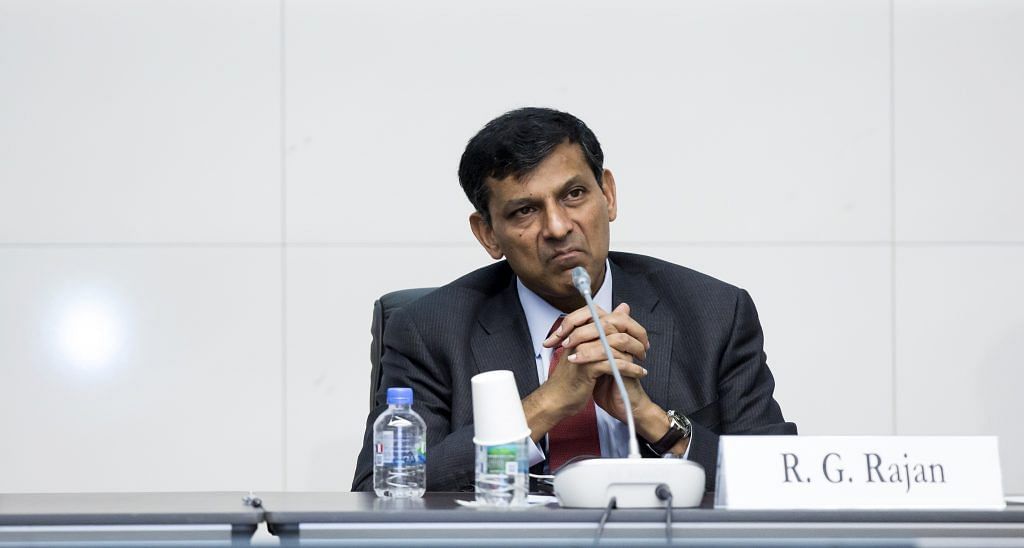The economists want political parties to use their suggestions for inclusive and sustainable growth when they set their poll manifestoes.
New Delhi: You know Ocean’s 11, 12 and 13. So what is Rajan’s 13? Caution: These are really smart and nice people, not another heist gang.
Chicago University Professor and former RBI governor Raghuram Rajan has brought together 13 top economists of Indian origin to draft an economic reform agenda for India for the next few years. And New Delhi’s elite economist-bureaucratic community has been quick to name them Rajan’s 13.
Last Friday, the group presented their economic agenda for India.
Besides Rajan, the other economists who have penned the five-year economic agenda for India across a host of issues, including the macroeconomy, health, education, banking reforms and infrastructure, are Abhijit Banerjee, Gita Gopinath, Neelkanth Mishra, Karthik Muralidharan, Eswar Prasad, Sajjid Chinoy, Amartya Lahiri, Rohini Pande, E. Somanathan, Pranjul Bhandari, Prachi Mishra and Maitreesh Ghatak.
The recommendations, a set of old and new reform measures, aim to put India onto a high inclusive and sustainable growth trajectory.
The economists strive to point out that none of them have any political affiliations and want their recommendations to be taken by political parties ahead of the manifesto-setting exercise as constructive feedback and criticism.
Also read: India’s growth not leading to jobs, farm loan waivers don’t help poor – Raghuram Rajan
The 13 economists
A look at the 13 economists shows that many of them have earned degrees or have taught at Harvard, have linkages with the Abdul Jameel Poverty Action Lab (J-Pal) and have worked closely with Rajan at some point in their academic or professional careers.
1) Raghuram Rajan: Currently a professor of finance at University of Chicago’s Booth School of Business, he has held the posts of Reserve Bank of India governor, chief economic adviser in the finance ministry and chief economist at the International Monetary Fund (IMF).
2) Karthik Muralidharan: A professor of economics at the University of California, San Diego, he has a Ph.D. in economics from Harvard and is a board member at J-Pal.
3) Abhijit Banerjee: A professor of economics at the Massachusetts Institute of Technology, he was one of the founders of J-Pal and remains one of its directors.
4) Gita Gopinath: Currently the chief economist at IMF, she has taught at Harvard and University of Chicago’s Booth School of Business.
5) Prachi Mishra: The managing director and chief India economist at Goldman Sachs, she has worked closely with Rajan at the RBI where she was a specialist adviser.
6) Eswar Prasad: Currently a professor at Cornell University, Prasad and Rajan were colleagues at IMF’s research department and have published many papers together.
7) Sajjid Chinoy: He is currently the chief India economist at JP Morgan.
8) Maitreesh Ghatak: He is a professor of economics at the London School of Economics.
9) Pranjul Bhandari: She is the chief India economist at HSBC.
10) Neelkanth Mishra: He is a managing director and India economist and strategist at Credit Suisse.
11) Amartya Lahiri: He is a director at RBI’s Centre for Advanced Financial Research and Learning.
12) E. Somanathan: He is a professor at the Indian Statistical Institute.
13) Rohini Pande: She is a professor at Harvard Kennedy School and has links with J-Pal.
Recommended reforms
The group of economists flagged jobless growth and the need to preserve macroeconomic stability and not trade it off for higher growth that can be used by opposition parties to question the track record of the Modi government on these crucial parameters.
They advocated low and stable inflation, a consolidated fiscal deficit of less than 5 per cent that leaves enough space for private investment and a sustainable current account deficit that can be financed by capital flows to maintain macro-economic stability.
They also advocate long-pending land and labour reforms, including allowing multi-year fixed-term labour contracts, greater decentralisation of power to states and local bodies, and overhauling the Right to Education Act to ensure better learning outcomes.
The economists also favoured doing away with government mandates for state-run banks for lending to specific sectors as well as a more independent board-led process for appointment of chiefs of these banks.
Also read: Loan waivers & lending targets for banks are signs of lazy govt, Raghuram Rajan says
Experts welcome move
“I think it is a positive move,” said N.K. Singh, chairman of the 15th Finance Commission, on the economists coming together to set the agenda. “This will generate a greater public debate and consciousness and encourage policymakers to think of both macro and structural reforms which will improve our growth trajectory.”
On the specific recommendation by the group to incentivise states to align with the Centre’s fiscal goals, Singh said, “Indeed, one of the terms of reference of the Finance Commission is to suggest a credible path of fiscal consolidation and overall macroeconomic management for the Union and the states. As far as the Union is concerned, the FRBM (Fiscal Responsibility and Budget Management) report has been accepted in the last Budget which gives the fiscal roadmap for the central government. As far as states are concerned, given the wide divergences both on the fiscal deficit and debt figures, it is a challenge for the commission to seek a convergence with the pattern consistent with both the practicality of fiscal compression and credible overall macro management.”
D.K. Srivastava, chief policy adviser at Ernst & Young India and a member of the 12th Finance Commission, agreed with the economists that growth is not creating enough jobs.
“I think the government has gone for a capital-intensive strategy so far. In order to increase employment, we need to focus on the services sector and the informal sector. We need to encourage sectors where less capital per unit of output is employed. We can generate much better employment through this strategy rather than the prevalent jobless growth,” he said.
